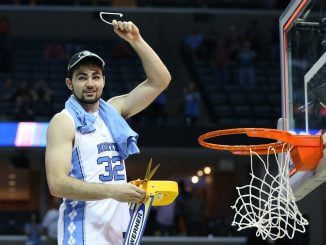
CHAPEL HILL — Talk might be cheap, as the old saying goes. But for the North Carolina football team it might just be the most valuable commodity there is to fixing the defensive problems that have been its downfall through the first two weeks of the season.
“Most of it is miscommunication,” Tar Heels coach Larry Fedora said earlier in the week. “Passing routes off and not getting it communicated. A lot of it was just mental mistakes.”
UNC ranks 126th out of 129 FBS teams nationally in total defense at 587.0 yards and has allowed an average of 41 points per game in its two losses to begin the season.
Many of the same mistakes that led to an opening day setback to California were repeated last week against Louisville. They only were amplified by the playmaking ability of the Cardinals’ Heisman Trophy-winning quarterback Lamar Jackson.
A pass rush that was supposed to be improved hasn’t generated enough pressure and when it has, rushers have failed to wrap up the opposing quarterback. That’s allowed them to look downfield and find wide open receivers for big plays.
Louisville had seven passes that went for 20 yards or more last Saturday, including a 75-yarder for a touchdown, while going for 10 or more yards 11 times on the ground. For the season, the Tar Heels have allowed 42 plays of 10 yards. At the rate they’re going, they’ll be burned for 273 of those big plays this season. That’s 125 more they allowed a year ago.
“Everybody’s not communicating,” defensive end Malik Carney said. “Not on the same page.”
So what exactly does “not communicating” mean?
More importantly, why is it an issue on a unit that returns seven starters and was being counted on to be the Tar Heels’ veteran backbone while its young offense worked to find a rhythm?
The latter is still a mystery yet to be solved. As for the former, Fedora said it comes down to the players on the field not helping one another understand and execute the calls that are being made from the sideline.
“Based on a formation, you’ve got to communicate the coverage that you’re going to run with each other,” Fedora said. “So based on splits, that adjusts some of the coverages and how you’re going to decipher those routes and then in the middle of the route there’s communication that has to be made.
“If you’re dropping a guy to pick someone else up and a crosser is coming, you’ve got to let the guy know next to you so he’s picking the guy up. So there’s communication on quite a bit of it that we didn’t get done.”
While Fedora put the blame for his team’s all-too-frequent defensive breakdowns squarely on the shoulders of the players, first-year defensive coordinator John Papuchis said he is equally at fault for the two subpar performances — especially last week’s debacle, in which Louisville’s 705 total yards were the third-most ever surrendered by UNC.
“There were a lot of reasons we didn’t play the way we wanted to play, but it starts with me and then it trickles down to them,” said Papuchis, who was the Tar Heels’ linebackers coach before taking over as coordinator following the retirement of Gene Chizik.
“I thought as the (Louisville) game went on and we weren’t having the success we were hoping to have coming into the game, we started to play tentatively and I started to call the game tentatively. You’re trying to plug all of the holes that are out there and sometimes you just have to play. And that starts with me. I’ve got to give them the opportunity to play.”
Fedora said that the problems that have plagued his defense are easily correctable and that steps have already been taken to fix what is broken. Both he and Papuchis said that they’ve seen marked improvement at practice this week.
One of the main areas of attention has been making sure the players actually know what they’re supposed to be doing on every play.
“When we’re putting in a game plan and the coach says, ‘OK, you guys understand that?’ And everybody says, ‘yes,’ you assume that they know it,” Fedora said. “But then you get out on Saturday and they don’t make that adjustment they obviously didn’t know it.
“So we’ve got to do a really good job (of making sure they know it). When I say communicating, that’s communication amongst players, that’s also communication with the coaching staff.”
If ever there was an opportunity for UNC’s defense to reverse course and get back on the right track, Saturday’s game at Old Dominion is it. The Monarchs are averaging only 325 yards per game and were only able to muster 17 points last week in a win against UMass of the Mid-American Conference.
Regardless of the opposition, Papuchis said it’s up to the Tar Heels to be better — both in their communication and execution.
The sooner the better.
“We either get it fixed immediately and finish the season and still have the goals that we want to accomplish as a team intact,” he said. “Or we let this thing slowly disintegrate.”


